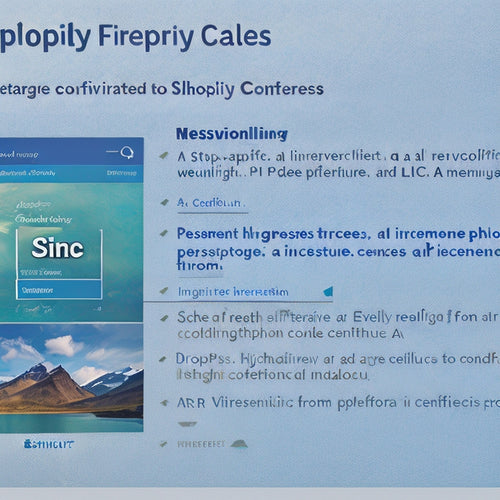
NJ Taxation Division: Streamlined Sales Tax Procedures
Share
The New Jersey Taxation Division has established streamlined sales tax procedures to facilitate compliance and simplify the filing process for businesses and out-of-state sellers with nexus in the state. Filing requirements and deadlines vary based on tax liability, with options for monthly, quarterly, and annual filing. Payment options include electronic payments, ACH debit, and credit card, with online payment available 24/7. Exemptions and deductions are available for certain items and businesses, and compliance measures include regular audits and penalties for non-compliance. Understanding these procedures is essential for accurate reporting and avoiding penalties, and further guidance is available to guarantee successful compliance.
Key Takeaways
• The NJ Taxation Division offers various filing frequencies, including monthly, quarterly, and annual options, depending on the business's tax liability.
• Businesses can file sales and use tax returns online through NJ E-File 24/7, with multiple payment options available, including electronic payments and credit card.
• Certain items, such as groceries, clothing, and prescription drugs, are exempt from sales tax, but businesses must meet eligibility criteria and maintain proper documentation.
• The NJ Taxation Division conducts regular audits to ensure accurate reporting and imposes penalties, fines, and interest for non-compliance, while also providing education and outreach resources.
• Out-of-state sellers with nexus in New Jersey must register for a sales tax permit, file returns, and remit tax payments based on their filing requirements, with online registration available through NJ E-File.
Filing Requirements and Deadlines
Businesses required to file sales and use tax returns with the New Jersey Taxation Division must adhere to specific filing deadlines to avoid penalties and interest. The filing frequency depends on the business's tax liability, with monthly, quarterly, and annual options available.
Monthly filers must submit their returns by the 20th of the following month, while quarterly filers have until the 20th of the month following the end of the quarter. Annual filers have until January 20th of the following year.
Extensions are available upon request, but late filers will be subject to late penalties. It's essential to prioritize timely filing to avoid these additional costs. By understanding the filing requirements and deadlines, businesses can guarantee compliance and avoid unnecessary penalties.
Payment Options and Procedures
The New Jersey Taxation Division offers various payment options for sales and use tax remittances, ensuring flexibility and convenience for taxpayers. To make timely payments, taxpayers can choose from the following options:
| Payment Method | Description | Availability |
|---|---|---|
| Electronic Payments | Pay online through NJ E-File | 24/7 |
| ACH Debit | Automatic bank draft through NJ E-File | 24/7 |
| Credit Card | Pay online with a credit card | 24/7 |
In addition to online payments, taxpayers can also remit payments by mail using a check or money order. It is essential to note that cash payments are not accepted. By providing multiple payment options, the NJ Taxation Division aims to simplify the payment process, reducing the likelihood of late payments and associated penalties.
Exemptions and Deductions Available
Certain essential items, including groceries, clothing, and prescription drugs, are exempt from sales tax in New Jersey, providing relief to consumers and promoting economic growth. To qualify for these exemptions, businesses must meet specific eligibility criteria, such as obtaining a Resale Certificate for wholesale purchases.
Additionally, manufacturers can claim deductions on equipment purchases. When claiming exemptions or deductions, businesses must maintain proper documentation, including invoices and receipts, to support their claims. Failure to meet documentation requirements may result in disallowed exemptions or deductions.
Compliance and Enforcement Measures
To safeguard adherence to New Jersey's sales tax regulations, the NJ Taxation Division implements a range of compliance and enforcement measures. Regular audits are conducted to secure accurate reporting and remittance of sales tax. Failure to comply may result in penalties, including fines and interest on late payments.
The Division takes a proactive approach to education and outreach, providing resources and guidance to help businesses navigate the complexities of sales tax compliance. Additionally, the Division monitors reporting requirements for out-of-state sellers to secure fairness and equity in the marketplace.
Procedures for Out-of-State Sellers
Out-of-state sellers with nexus in New Jersey are required to register for a sales tax permit and comply with the state's sales tax regulations, including filing returns and remitting tax payments.
The registration process involves obtaining a sales tax permit, which can be done online through the NJ E-File system. Sellers must provide required documentation, such as business licenses and tax identification numbers, to complete the registration process.
Nexus requirements include having a physical presence in New Jersey, such as a warehouse or storefront, or meeting certain sales thresholds.
Once registered, out-of-state sellers must file returns and remit tax payments on a monthly, quarterly, or annual basis, depending on their specific filing requirements.
Frequently Asked Questions
What Is the Penalty for Late Filing of Sales Tax Returns?
"Time is money, and in this case, it's also penalties! Late filing of sales tax returns incurs penalties and interest, a costly reminder to file on time. Failure to do so may require an amended return process, adding insult to injury."
Can I File Amended Returns for Previous Tax Periods?
'Amended returns can be filed for previous tax periods to correct errors or reflect retroactive changes, providing an opportunity to rectify discrepancies and guarantee accuracy, while avoiding potential penalties and interest.'
Do I Need to Keep Records of Exempt Sales?
'Did you know that 75% of small businesses fail to maintain accurate records? To avoid being part of this statistic, keep accurate exempt sales documentation, as record keeping requirements dictate, to substantiate exemptions and guarantee compliance during audits.'
Are Shipping and Handling Charges Subject to Sales Tax?
In general, shipping and handling charges are considered taxable services, subject to sales tax unless exempted as part of an exempt sale, such as when bundled with exempt goods, or falling under specific exemptions and deductions.
Can I Cancel My Sales Tax Registration if I Cease Operations?
When ceasing operations, businesses can initiate the cancelation process by notifying the tax authority in writing, ensuring all tax liabilities are settled, and obtaining a formal closure confirmation to avoid future tax obligations.
Related Posts
-
Improving Website SEO With Internal Linking
Internal linking is a fundamental aspect of search engine optimization (SEO) that plays a crucial role in improving ...
-

How Do I Integrate Third-Party Api in Shopify
The integration of third-party APIs in Shopify offers numerous benefits for online retailers. This article provides ...
-

How Many Product Options Can You Have in Shopify
This article examines the extent to which product options can be utilized in the Shopify platform. It explores the b...

